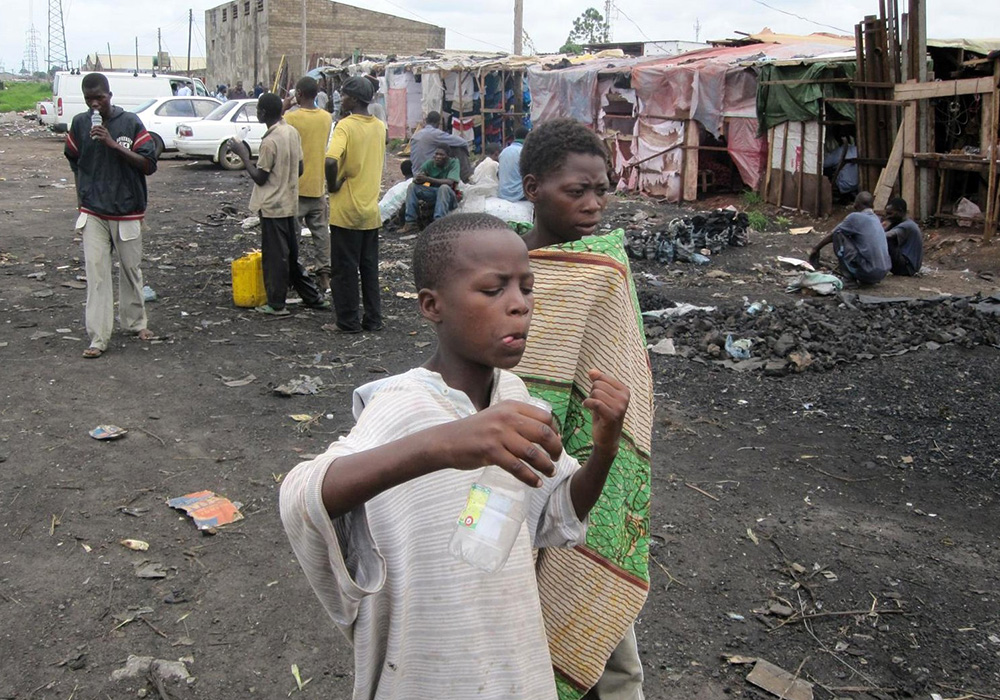
Children roam a street in Lusaka, Zambia, in this undated photo. Countries such as Zambia that are struggling with their sovereign debt would benefit from a new bill in New York that would require vulture funds to play by the same rules as other creditors. (CNS/The Catholic Spirit/Carol McBrady)
A bill is making its way through the famously challenging legislature of New York state in Albany that holds the potential to alleviate suffering for some of the poorest nations on the planet. "The legislation — comprised of proposals in both the state senate and assembly — would force investors in defaulted sovereign bonds to accept comparable losses to governments and other public creditors during restructurings," Bloomberg reports.
That sounds very technical and a bit abstruse. And I am no economist. But, in a nutshell, the legislation is designed to address a moral problem that is easy to understand. Desperate countries sometimes get into financial difficulties and have trouble paying their bills. If it looks like they are going to default on their sovereign debt, the price for their bonds drops, sometimes to junk bond status. Venture capital firms, known as "vulture funds," buy the bonds for pennies on the dollar and then demand payment in full. They bring armies of lawyers to enforce their demands. The poor countries are impoverished even more. This new law requires the vulture funds to play by the same rules as other creditors, to take a haircut rather than enforce austerity measures on the poor countries and their people.
The pandemic wreaked havoc on the world economy, but many developing countries, from El Salvador to Zambia, are struggling with their sovereign debt. Ukraine, too, is unable to service its debt to the war and key strategic countries like Pakistan are also heading into crisis.

Zambian children attend school in a poverty-stricken area near the country's capital, Lusaka, July 1, 2005. (CNS/Reuters)
"The New York Taxpayer and International Debt Crises Protection Act is about completing the Jubilee call for global debt relief that was heralded by Pope John II and other Christian, Jewish and Muslim religious leaders 25 years ago," Eric LeCompte, executive director of Jubilee USA, explained to me in an email interview. Jubilee USA has been a leading advocate for the just treatment of poorer countries at the hands of world markets and global organizations like the International Monetary Fund.
In Albany, as elsewhere, Jubilee USA has assembled a diverse coalition to advocate for the bill. "There is an incredible religious, labor and development coalition that is moving forward this legislation," LeCompte said. "The New York State Council of Churches, Jewish leaders, the New York Catholic Conference, Puerto Rico government and religious leaders, the state's largest unions and development groups like Oxfam are just a few of the many groups pushing this new law across the finish line."
LeCompte and his organization were deeply involved in the negotiations over Puerto Rico's debt crisis. From the start of that crisis back in 2015 through the successful negotiation of a settlement in 2022 LeCompte helped the island's religious leaders articulate the moral case against austerity and, therefore, against the vulture funds.
Those Puerto Rican religious leaders have thrown their support behind the proposed law in New York. "Since the beginning of our crisis in Puerto Rico we have supported solutions for all people of our world to live in dignity and with enough," an ecumenical group, including San Juan's Catholic Archbishop Roberto Gonzalez, stated in a letter sent to all New York legislators. "We favor this legislation because it will be positive for our brothers and sisters across the Caribbean, Latin America and Asia. As you know, Christian Churches have advocated debt relief with Jubilee USA since 1997."
Advertisement
A memorandum of support for the law from the New York State Catholic Conference was also distributed to the legislators. "In an American political era defined by fierce partisanship, global debt relief has been a rare instance of bipartisanship, dating back to the Clinton administration and through every subsequent administration, Democrat and Republican," the memorandum stated. "Unfortunately, while the United States and other nation-creditors have largely embraced the wisdom of debt relief, the private sector has failed to participate in these initiatives that are a cornerstone of US bipartisan policy."
Labor leaders, who also played a key role in resolving the Puerto Rican crisis, are at the forefront of this fight, too. "The standards established by this bill will limit the ability of private holders of international debt from using predatory practices to demand cuts in spending that prioritize repayment of that debt above the well-being of the populace," stated the New York AFL-CIO's memorandum of support. "This will allow a more reasonable debt recovery process that will help protect vital services needed by the most vulnerable populations as well as working families that rely on government funding and programs."
From London, former national AFL-CIO policy director Damon Silvers explained the benefits that will accrue to everyone from the poor nations affected to U.S.-based pension funds that do not engage in predatory behaviors. "The law will ensure that all debt holders and creditors from commercial banks to predatory hedge funds will provide debt relief when countries need it, just like the U.S. government does," he told me. "The law is to the advantage of private firms because it helps restructure debts back to profitability and can protect our pensions."
Silvers, you will recall, recently delivered a magnificent series of lectures on the ill-effects and lousy morals of neoliberalism, and these vulture funds could be Exhibit A in the neoliberal hall of horrors.
The monied interests behind the vulture funds, as well as those with an ideological commitment to neoliberalism, will be lobbying heavily in Albany to prevent this bill from becoming law. "The reason this is a law that must pass in New York is because it's the world's primary financial jurisdiction," explains LeCompte. "The debt contracts that are signed under New York law between private firms and countries total more than half of all of the world's private lending to countries."
The struggle to consign neoliberal economics and its idolatry of free markets to the history books will not be won or lost with this one fight in Albany. But if this new law passes, it will do more than prevent exploitative behavior by U.S. venture capitalists in the sovereign debt market. It will show that an alliance of working people and religious organizations can still articulate a vision of the common good and of a more just future that is compelling.







